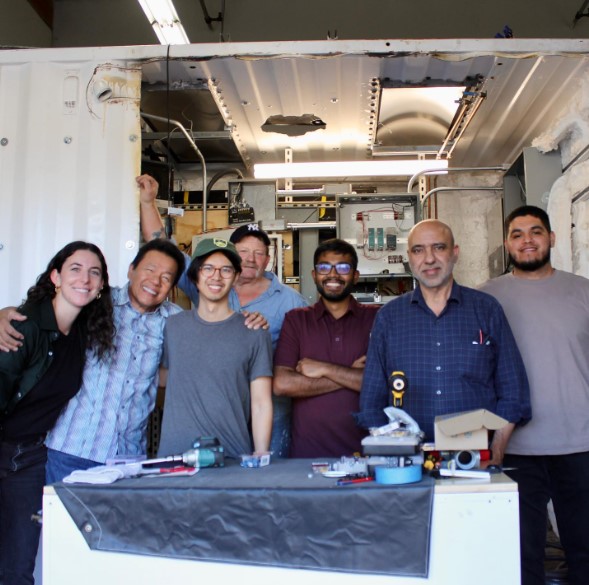(February 16, 2024) Anurag Kamal, inspired by his early work on electric trucks at Eicher Motors and the burgeoning electric vehicle (EV) revolution led by Tesla, transitioned from conventional internal combustion engines to a focus on EVs, culminating in his co-founding of ElectricFish in 2019. The Forbes 30 Under 30 is the co-founder of ElectricFish, a climate tech innovator, is redefining the EV charging experience with its software-powered, distributed energy storage solutions, utilizing 100% renewable energy to enhance local energy resilience and streamline EV charging.

Anurag Kamal
From Eicher to ElectricFish
Anurag Kamal began his career at Eicher Motors, where he began working with conventional internal combustion engines. During the two years he worked there, he transitioned to electric transportation, as the company began developing its first electric truck. “At Eicher, I came to realise the important role electric vehicles play in reducing emissions,” the Global Indian said in an interview. At around the same time, Tesla was being built in the U.S. It was an exciting development, one that prompted him to move to the US, where he did a master’s in Mechanical Engineering at Michigan Technological University. He continued to pursue his interest in EVs, studying inverters, motors and batteries. Eventually, he wrote his master’s thesis on the mathematical modelling of aging in lithium ion cells.
After graduation, Anurag moved to Silicon Valley where he joined BMW and worked on their i4 electric optimization systems, as well as using his time to attend industry and climate conferences. “I understood there was a massive need for energy storage and EV charging infrastructure in the coming years and that integrating those two domains would make sense.” In 2019, Anurag co-founded ElectricFish with Vince Wong and Nelio Batista, after he pitched the idea of an integrated energy storage and EV charging service at a hackathon in San Francisco. Anurag, Wong and Batista continued working together after that, and eventually attended an accelerator at the Stanford Graduate School of Business. There, they met their fourth co-founded, Folosade Ayoola.
What is ElectricFish?


Anurag Kamal and the ElectricFish team
Founded in 2019, ElectricFish is a pioneering climate technology company that focuses on revolutionizing the electric vehicle (EV) charging experience while promoting energy resilience in local communities through the use of 100% renewable energy. At the heart of ElectricFish’s mission is the development of distributed energy storage systems, powered by advanced software, to address some of the critical challenges facing the electric grid and EV infrastructure today.
ElectricFish’s approach involves creating a network of energy storage solutions that are distributed across various locations, rather than relying on centralized energy storage facilities. This method allows for a more efficient management of energy distribution, ensuring that power is readily available closer to where it is needed, especially in areas with high demand for EV charging or those vulnerable to power outages and grid instability. They currently use a lithium iron phosphate battery, which is slightly safer in case of a fire than the traditional lithium-ion versions.
The product
“It’s a big battery,” Anurag laughed, in an interview. “It can do bi-directional energy transfers from the electricity grid (stored energy) and makes decisions about when to store and when to feed energy.” It also comes with an extreme fast charging port with a 200mAH range. “You charge your car from seven to 10 minutes and it can go another 150-200 miles,” he explains. In comparison, there are over 1,70,000 publicly available EV charging ports in the US, which are a mix of both regular (Level 2) and fast charging (DC Fast Charging) stations. Level 2 charging stations, which are the most common, provide around 20 to 30 miles of range per hour of charging.
ElectricFish’s 350², which is a plug-and-play energy storage system, works with all vehicle architectures from 300 to 950 VDC. Their software-backed smart chargers can store cheap, clean power supply from the grid and shift this power through the day when required.
View this post on Instagram
How is it different?
Normally, an EV is plugged for around eight hours in a parking spot. Tesla is the only other company that provides extreme fast charging and this is mainly compatible with its own vehicle architecture and works with 400-600 volt batteries, Anurag explains. Only Tesla vehicles, as well as other EVs like the Hummer, which have such large architectures, can use these charging stations. 350² is also designed to power community loads through its bi-directional electricity meter and an ultrafast CCS port.
Not only do ElectricFish batteries offer extreme fast charging for non-Tesla cars, they also don’t deplete energy from the grid. Instead, the batteries can learn how to draw energy when demand is low and store it for later use. “It’s green and available to charge cars very quickly,” Anurag says. They work with convenience stores, municipal depots and car dealerships as well. “The idea is to slowly grow the business and have enough critical mass of stored energy.”
Who are their customers?
ElectricFish currently has three customer segments: convenience stores/ gas stations, fleet operators and utilities. “Car dealerships are also becoming a key segment,” Anurag adds. Convenience stores that are usually located with gasoline pumps were the first target group. “Our fast EV chargers provide a gasoline-like experience for customers, where they can get their EV charged, grab something to eat and continue their journey.” Getting up to 200 miles of range in 10 minutes is very handy, especially on long-haul trips. Fleet operators are also looking to electrify their vehicles and need a quickly deployable charging solution. “Electric utilities are also interested in our product as either adding energy storage at substations or providing EV charging services for their customers. We are part of several electric utilities’ innovation programs across the US,” he explains.
Follow ElectricFish on Instagram




